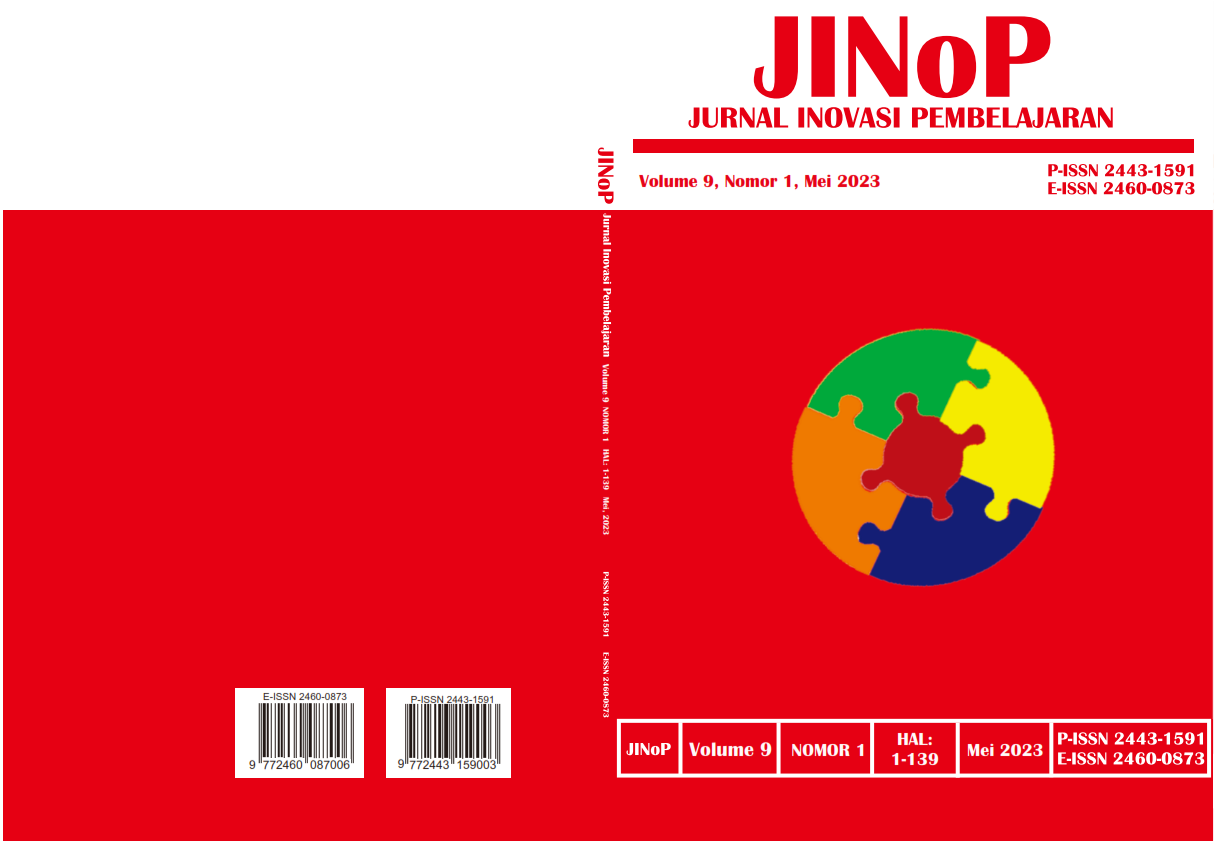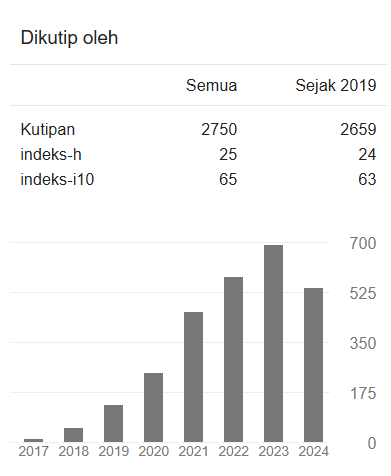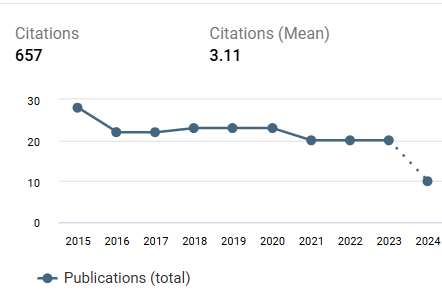Pengembangan e-modul berbasis PBL untuk meningkatkan kemampuan analisis dan rasa ingin tahu siswa
DOI:
https://doi.org/10.22219/jinop.v9i1.23178Keywords:
Analytical Skills, Coordination Material, Curiosity, E-Module, PBLAbstract
Coordination system content in Biology learning is still considered difficult because the material is broad, complex, and difficult to visualize in real life. Problem based learning could become an alternative learning model to train students' problem-based analysis skills and curiosity. This study aims to develop a PBL-based e-module of coordination system topic in the form of a website and to determine the effectiveness of the developed e-module to improve the analysis skills and curiosity of high school students at grade XI. The development of e-module used the ADDIE model (Analysis, Design, Development, Implementation, and Evaluation). Validity of e-modules was done by media and content experts. The trial of the developed e-module was conducted to XII grade students of SMA 1 Cangkringan. The research subjects were students of class XI SMA 1 Cangkringan, who were selected with purposive sampling technique. They are divided into experimental and control groups. Analysis ability was measured with essay test, while curiosity was measured with adapted the curiosity non-test instrument. Data were analyzed using Mann Whitney test. The results showed that 1) the developed e-module was feasible to use based on the assessment from material and media experts, and responses from teacher and students, 2) PBL-based e-module in the form of a website is effective in improving students' analytical skills (p=0.024) and curiosity (p=0.000). It can be concluded that PBL-based e-module can improve students' analytical skills and curiosity.
Downloads
References
Huda Alamil, & Erlangga Rifqi. (2023). Pengembangan Evaluasi Pembelajaran Milanpulsa Berpedoman Pada Computer Adaptive Test (CAT) Untuk Peniaian Kognitif Tematik. Jurnal Sekolah PGSD FIP UNIMED, 7(2), 169–175.
Aini, F., Edriati, S., & Pratama, A. (2023). Pengembangan Media Pembelajaran Interaktif di SMK Muhammadiyah 1 Padang. Jurnal Pendidikan Tambusai, 7(1), 2425–2430.
Akben, N. (2020). Effects of the Problem-Posing Approach on Students’ Problem Solving Skills and Metacognitive Awareness in Science Education. Research in Science Education, 50(3), 1143–1165. https://doi.org/10.1007/s11165-018-9726-7
Alammary, A., Alhazmi, S., Almasri, M., & Gillani, S. (2019). Blockchain-based applications in education: A systematic review. In Applied Sciences (Switzerland) (Vol. 9, Issue 12). MDPI AG. https://doi.org/10.3390/app9122400
Amalia, N. F., & Pujiastuti, E. (2013). Kemampuan berpikir kritis dan rasa ingin tahu melalui model pbl. Seminar Nasional Matematika X Universitas Negeri Semarang 2016, 523–531.
Aprileny Hutahaean, L., Siswandari, & Harini. (2019). Pemanfaatan E-Module Iteraktif Sebagai Media Pembelajaran di Era Digital. Prosiding Seminar Nasional Teknologi Pendidikan Pascasarjana UNIMED, 1(2018), 298–305.
Baidlowi, M. H., Sunarmi, & Sulisetijono. (2019). Biosfer : Jurnal Pendidikan Biologi. Biosfer: Jurnal Pendidikan Biologi, 10(2), 57–65.
Chai, C. S., Rahmawati, Y., & Jong, M. S. Y. (2020). Indonesian science, mathematics, and engineering preservice teachers’ experiences in stem-tpack design-based learning. Sustainability (Switzerland), 12(21). https://doi.org/10.3390/su12219050
Chen, C. K., Huang, N. T. N., & Hwang, G. J. (2022). Findings and implications of flipped science learning research: A review of journal publications. Interactive Learning Environments, 30(5), 949–966. https://doi.org/10.1080/10494820.2019.1690528
Darmaji, Astalini, Kurniawan, D. A., Parasdila, H., Iridianti, Susbiyanto, Kuswanto, & Ikhlas, M. (2019). E-Module based problem solving in basic physics practicum for science process skills. International Journal of Online and Biomedical Engineering, 15(15), 4–17. https://doi.org/10.3991/ijoe.v15i15.10942
Duda, H. J., Susilo, H., & Newcombe, P. (2019). Enhancing different ethnicity science process skills: Problem-based learning through practicum and authentic assessment. International Journal of Instruction, 12(1), 1207–1222. https://doi.org/10.29333/iji.2019.12177a
Fitriana, N., Widayanti, F. D., & Firmanto, B. (2021). Problem Base Learning Virtually In Blended Learning Model for Chemistry Lessons During The Covid-19 Pandemic. Jurnal Pendidikan Sains (Jps), 9(1), 14. https://doi.org/10.26714/jps.9.1.2021.14-25
Hofer, S. I., Nistor, N., & Scheibenzuber, C. (2021). Online teaching and learning in higher education: Lessons learned in crisis situations. Computers in Human Behavior, 121(November 2020), 106789. https://doi.org/10.1016/j.chb.2021.106789
Hera, R., Khairil, & Hasanuddin. (2014). Pengembangan Handout Pembelajaran
Embriologi Berbasis Kontekstual Pada Perkuliahan Perkembangan Hewan Untuk Meningkatkan Pemahaman Konsep Mahasiswa Di Universitas Muhammadiyah Banda Aceh. Jurnal EduBio Tropika, 2(2), 187–250
İDAWATİ, İ., SETYOSARİ, P., KUSWANDİ, D., & ULFA, S. (2020). The Effects of Problem Solving Method and Cognitive Flexibility in Improving University Students’ Metacognitive Skills. Journal for the Education of Gifted Young Scientists, 8(June), 657–680. https://doi.org/10.17478/jegys.652212
Imansari, N., & Sunaryantiningsih, I. (2017). Pengaruh Penggunaan E-Modul Interaktif Terhadap Hasil Belajar Mahasiswa pada Materi Kesehatan dan Keselamatan Kerja. VOLT : Jurnal Ilmiah Pendidikan Teknik Elektro, 2(1), 11. https://doi.org/10.30870/volt.v2i1.1478
Inanna, Nurjannah, Ampa, A. T., & Nurdiana. (2021). Media Pembelajaran Modul Elektronik (E-Modul) sebagai Sarana Pembelajaran Jarak Jauh. Seminar Nasional Hasil Penelitian, May, 1–4.
Lenaini, I. (2021). Teknik Pengambilan Sampel Purposive Dan. Jurnal Kajian, Penelitian & Pengembangan Pendidikan Sejarah, 6(1), 33–39.
Lestari, E., Nulhakim, L., & Indah Suryani, D. (2022). Pengembangan E-modul Berbasis Flip Pdf Professional Tema Global Warming Sebagai Sumber Belajar Mandiri Siswa Kelas VII. PENDIPA Journal of Science Education, 6(2), 338–345. https://doi.org/10.33369/pendipa.6.2.338-345
Liu, Y., & Fan, L. (2023). Research on Hybrid Teaching of Curriculums Based on the ADDIE Model. In Proceedings of the 2nd International Conference on Culture, Design and Social Development (CDSD 2022) (pp. 220–232). Atlantis Press SARL. https://doi.org/10.2991/978-2-38476-018-3_23
Mareti, J. W., Herlina, A., & Hadiyanti, D. (2021). Model Problem Based Learning Untuk Meningkatkan Kemampuan Berpikir Kritis dan Hasil Belajar IPA Siswa. Jurnal Elementaria Edukasia, 4(1), 31–41. https://doi.org/10.31949/jee.v6i1
Nurhemy, T., Sutarno, S., & Prayitno, B. (2019). EFEKTIVITAS MODUL BERBASIS PROBLEM SOLVING UNTUK MENINGKATKAN KEMAMPUAN ANALISIS SISWA. INKUIRI: Jurnal Pendidikan IPA, 8. https://doi.org/10.20961/inkuiri.v8i2.37751
Nurul Qomariyah, I., & Ayu Widyaningrum, D. (2022). Pengembangan Modul Praktikum Anatomi Fisiologi Manusia Tingkat Perguruan Tinggi. In Jurnal Filsafat, Sains, Teknologi, dan Sosial Budaya (Vol. 28).
Nurulita, M. F., & B, F. P. M. H. (2022). The Problem-Based E-Module as Learning Suplement to Improve Student s ’ Learning Outcomes. 11(11), 272–281.
Okta Susilawati, W., & Andiyanto. (2021). PENGEMBANGAN E-MODUL PEMBELAJARAN PERKEMBANGAN SOSIAL AUD BERBASIS KARAKTER MENGGUNAKAN SOFTWARE FLIPBOOK MAKER. Inspiratif Pendidikan, 10(2), 1–18. http://online.anyflip.com/iuknb/ixtq/
Pendidikan, J., & Caesariani, N. A. (2018). PEMANFAATAN MULTIMEDIA INTERAKTIF PADA MODEL PROBLEM BASED LEARNING (PBL) DALAM PEMBELAJARAN MATEMATIKA. 2.
Rahmawati, M., Yani T, A., Sayu, S., Fitriawan, D., Suratman, D., Bs, D. A., Kependidikan, F., Pendidikan, D. I., & Tanjungpura, U. (2023). PENGEMBANGAN MEDIA PEMBELAJARAN TEOREMA PHYTAGORAS MENGGUNAKAN E-COMIC BERBANTUAN PIXTON. Jurnal Penelitian Matematika Dan Pendidikan Matematika, 6(1), 155–163. https://doi.org/10.30605/proximal.v5i2.2086
Permana, I., Zulhijatiningsih, Z., & Kurniasih, S. (2021). Efektivitas E-Modul Sistem Pencernaan Berbasis Problem Solving Terhadap Kemampuan Pemecahan Masalah. Jurnal IPA & Pembelajaran IPA, 5, 36–47. https://doi.org/10.24815/jipi.v5i1.18372
Pramana, M. W. A., Jampel, I. N., & Pudjawan, K. (2020). Meningkatkan Hasil Belajar Biologi Melalui E-Modul Berbasis Problem Based Learning. Jurnal Edutech Undiksha, 8(2), 17. https://doi.org/10.23887/jeu.v8i2.28921
Prawita, W., Prayitno, B. A., & Sugiyarto. (2019). Effectiveness of a generative learning-based biology module to improve the analytical thinking skills of the students with high and low reading motivation. International Journal of Instruction, 12(1), 1459–1476. https://doi.org/10.29333/iji.2019.12193a
Rahardja, U. (2022). Penerapan Teknologi Blockchain Dalam Pendidikan Kooperatif Berbasis E-Portfolio. Technomedia Journal, 7(3), 354–363. https://doi.org/10.33050/tmj.v7i3.1957
Raharja, S., Wibhawa, M. R., & Lukas, S. (2018). Mengukur Rasa Ingin Tahu Siswa [Measuring Students’ Curiosity]. Polyglot: Jurnal Ilmiah, 14(2), 151. https://doi.org/10.19166/pji.v14i2.832
Rahmatsyah, S. W., & Dwiningsih, K. (2021). Development of Interactive E-Module on The Periodic System Materials as an Online Learning Media. Jurnal Penelitian Pendidikan IPA, 7(2), 255. https://doi.org/10.29303/jppipa.v7i2.582
Ratanasabilla, N. E., Sriyati, S., & Hamdiyati, Y. (2021). Penerapan peta konsep sebagai strategi asesmen formatif dalam upaya meningkatkan hasil belajar siswa pada pembelajaran sistem koordinasi. Assimilation: Indonesian Journal of Biology Education, 4(1), 16–23. https://doi.org/10.17509/aijbe.v4i1.29999
Saepuloh, D., Sabur, A., Lestari, S., & Mukhlishoh, S. U. (2021). Improving Students’ Critical Thinking and Self-Efficacy by Learning Higher Order Thinking Skills Through Problem Based Learning Models. JPI (Jurnal Pendidikan Indonesia), 10(3), 495. https://doi.org/10.23887/jpi-undiksha.v10i3.31029
Sawitri, R. N., Agustina, W., & Mulyani, B. (2015). UPAYA PENINGKATAN KEMAMPUAN ANALISIS DAN PRESTASI BELAJAR SISWA MELALUI STRATEGI PROBLEM BASED LEARNING (PBL) DENGAN MEDIA LABORATORIUM PADA MATERI POKOK STOIKIOMETRI KELAS X-MIA 3 SMA NEGERI 5 SURAKARTA TAHUN PELAJARAN 2014/2015. http://jurnal.fkip.uns.ac.id/index.php/kimia
Sidiq, R., Najuah, & Suhendro, P. (2021). Utilization of Interactive E-Modules in Formation of Students’s Independent Characters in the Era of Pandemic. International Journal of Education Research & Social Science, 2(6), 1651–1657.
Simanjuntak, M. P., Hutahaean, J., Marpaung, N., & Ramadhani, D. (2021). Effectiveness of problem-based learning combined with computer simulation on students’ problem-solving and creative thinking skills. International Journal of Instruction, 14(3), 519–534. https://doi.org/10.29333/iji.2021.14330a
Sinaga, S. J., Najamuddin, N., Dewi, D. A., Widodo, U., Siahaan, K. W. A., Misbah, M., Achmad, G. H., & Mobo, F. D. (2023). Implementation of PBL Model on Strengthening Students’ Numerical Literacy and Digital Literacy Skills. Jurnal Obsesi : Jurnal Pendidikan Anak Usia Dini, 7(1), 575–586. https://doi.org/10.31004/obsesi.v7i1.3123
Sugiyanto, A. R. P. P. N. (2020). Efektivitas Model Guided Discovery Learning Berbantuan Animasi Macro Media Flash Terhadap Penurunan Miskonsepsi Materi Sistem Koordinasi di SMA.
Tegeh, I. M., & Kirna, I. M. (2013). Pengembangan Bahan Ajar Metode Penelitian Pendidikan dengan ADDIE Model. Jurnal IKA, 11(1), 16. https://ejournal.undiksha.ac.id/index.php/IKA/article/view/1145
Umut Roziboyovich, K. (2023). ESSENTIAL CHARACTERISTICS OF THE CONCEPTS “FLIPPED CLASSROOM” AND “PODCASTS” IN MODERN TEACHING METHODOLOGY. https://doi.org/10.55640/eijmrms-03-01-19
Vina Serevina, Sunaryo, Raihanati, I Made Astra, I. J. S. (2018). Development of E-Module Based on Problem Based Learning (PBL) on Heat and Temperature to Improve Student’s Science Process Skill. TOJET: The Turkish Online Journal of Educational Technology –, 17(3), 26–36.
Wulandari, I. G. A. A. M., Sudatha, I. G. W., & Simamora, A. H. (2020). Pengembangan Pembelajaran Blended Pada Mata Kuliah Ahara Yoga Semester II di IHDN Denpasar. Jurnal Edutech Undiksha, 8(1), 1. https://doi.org/10.23887/jeu.v8i1.26459
Yanthi, M. D., Bhilawa, L., & Siregar, C. S. (2022). Kelayakan Buku Ajar Analisis dan Perancangan Sistem Informasi. Mimbar Ilmu, 27(2), 292–299. https://doi.org/10.23887/mi.v27i2.43997
Yuni Kartika, I. A. N. A., Astra, I. K. B., & Suwiwa, I. G. (2022). Media Pembelajaran Berbasis Video Tutorial Teknik Dasar Pointing dalam Permainan Petanque. Indonesian Journal of Sport & Tourism, 4(2), 74–83. https://doi.org/10.23887/ijst.v4i1.45030
Downloads
Published
How to Cite
Issue
Section
License
Copyright (c) 2023 Jayanti et al

This work is licensed under a Creative Commons Attribution 4.0 International License.
Copyright Notice
Authors who publish with JINoP (Jurnal Inoasi Pembelajaran) agree to the following terms:
- For all articles published in the JINoP (Jurnal Inovasi Pembelajaran), copyright is retained by the authors. Authors give permission to the publisher to announce the work with conditions. When the manuscript is accepted for publication, the authors agree to the automatic transfer of the publishing right to the publisher.
- Authors retain copyright and grant the journal the right of first publication with the work simultaneously licensed under a Creative Commons Attribution 4.0 International License. that allows others to share the work with an acknowledgment of the work's authorship and initial publication in this journal.
- Authors are able to enter into separate, additional contractual arrangements for the non-exclusive distribution of the journal's published version of the work (e.g., post it to an institutional repository or publish it in a book), with an acknowledgment of its initial publication in this journal.
- Authors are permitted and encouraged to post their work online (e.g., in institutional repositories or on their website) prior to and during the submission process, as it can lead to productive exchanges, as well as earlier and greater citation of published work (See The Effect of Open Access).








